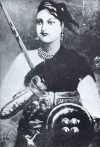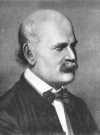 In 1857, Indian troops in the service of the English East India Company ignited a massive rebellion. They refused to use rifle cartridges thought to be lubricated with grease containing a mixture of pigs’ and cows’ lard, considered religiously impure. Lakshmi Bai—queen of the Indian state of Jhansi—became an unlikely hero in the rebellion. When a British commander vowed to destroy Jhansi unless its people surrendered, Lakshmi Bai asserted that they would fight to the death. What happened to her? Discuss
In 1857, Indian troops in the service of the English East India Company ignited a massive rebellion. They refused to use rifle cartridges thought to be lubricated with grease containing a mixture of pigs’ and cows’ lard, considered religiously impure. Lakshmi Bai—queen of the Indian state of Jhansi—became an unlikely hero in the rebellion. When a British commander vowed to destroy Jhansi unless its people surrendered, Lakshmi Bai asserted that they would fight to the death. What happened to her? Discuss
Source: The Free Dictionary
 The Russian State Library in Moscow is the largest library in Europe and the second largest in the world, behind the Library of Congress. Its collection of more than 43 million items in 248 languages includes more than 17 million books, brochures, and serials; 13 million journals; and 650,000 newspapers. Its specialized collections feature maps, art publications, printed music, and manuscripts. The library was named after what Russian revolutionary before being given its current name in 1992?
The Russian State Library in Moscow is the largest library in Europe and the second largest in the world, behind the Library of Congress. Its collection of more than 43 million items in 248 languages includes more than 17 million books, brochures, and serials; 13 million journals; and 650,000 newspapers. Its specialized collections feature maps, art publications, printed music, and manuscripts. The library was named after what Russian revolutionary before being given its current name in 1992?  The
The  Semmelweiss was a Hungarian physician who pioneered the use of antiseptics in obstetrical clinics. While working at a Vienna hospital, he became convinced that physicians were transmitting puerperal fever, also called childbed fever, to patients and began insisting that doctors thoroughly cleanse their hands. Though this greatly reduced the mortality rate from infection in childbirth, he was widely ridiculed by his colleagues and left Vienna. When was the value of his work finally recognized?
Semmelweiss was a Hungarian physician who pioneered the use of antiseptics in obstetrical clinics. While working at a Vienna hospital, he became convinced that physicians were transmitting puerperal fever, also called childbed fever, to patients and began insisting that doctors thoroughly cleanse their hands. Though this greatly reduced the mortality rate from infection in childbirth, he was widely ridiculed by his colleagues and left Vienna. When was the value of his work finally recognized?  Known only from one incomplete copy discovered in 1890, the Story of Wenamun tells the tale of an Egyptian priest and his journey to Byblos in Phoenicia. Once widely believed to be an actual historical account, the story is now generally accepted by Egyptologists as a work of historical fiction. Still, the vivid narrative, written in the ancient Egyptian writing system of hieratic, is often treated by historians as a primary source on the late 20th Dynasty. In what year is the story set?
Known only from one incomplete copy discovered in 1890, the Story of Wenamun tells the tale of an Egyptian priest and his journey to Byblos in Phoenicia. Once widely believed to be an actual historical account, the story is now generally accepted by Egyptologists as a work of historical fiction. Still, the vivid narrative, written in the ancient Egyptian writing system of hieratic, is often treated by historians as a primary source on the late 20th Dynasty. In what year is the story set?